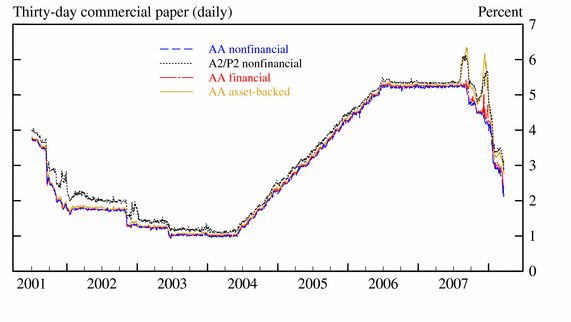
|
|
Discount rate history: Daily thirty-day commercial paper.
(Federal Reserve) |
|
Every Economic Cloud Has A Silver Lining
Or at least a green one.
-- Daniel E. Loeb
Economic experts declare that America may be going into a recession. The Federal
Reserve System's open market committee has reduced the prime rate
That is terrible economic news.
Or is it?
Officially the U.S. economy is in a recession when our Gross Domestic Product
as measured by the U.S. Department of Commerce
declines for two consecutive
quarters.
In other words, our economy has "failed" when we stop producing quite as much stuff as we used to.
Apparantly, we Americans are not living up to our patriotic duties and through
our consumption encouraging manufacturers to produce
quite as much stuff.
|
|
|
Anne Leonard's Story
of Stuff is a provocative tour of our consumer-driven culture - from resource
extraction to iPod incineration - exposing the real cost of our use-it and lose-it
approach to stuff. |
|
Part of the problem with this analysis is that we are not including the depletion of our natural resources in our calculations.
If we produce consumer products but deplete our national treasure of irreplaceable resources, consume natural resources at an unsustainable rate
and ruin the environment for generations to come, are we really better off?
All publically traded companies aspire to build value for their shareholders. They
try to maximize the discounted present value of their future revenue.
For example, suppose I own a piece of wooded land, I could clear cut the land, sell
the wood to a lumber mill and the land to a real estate developer for an immediate
payment of one million dollars. Alternatively, I could harvest only the maximum
sustainable yield annual tree growth and thus produce, in a sustainable manner,
a permanent revenue of ,say fifty thousand dollars per year.
Which is better?
If the million dollars in sales are invested at an interest rate of 7%, they produce
permanent revenue of seventy thousand dollars per year, so a corporation mindful
of their shareholders will cover the forest with asphalt as soon as they can.
If the country is in a recession and interest rates go down to 3%, the million dollars
only return thirty thousand dollars per year, so a smart corporation will engage
in sustainable development preserving the forest for future generations.
By this logic, people do not plan as carefully for the future if interest rates
are high. However, should our stewardship of our resources and indeed this planet
truly depend on interest rates? The stakes are quite high. This logic applies not
only to timberland in the Northwest United States but to the Amazon rain forest as well.
The Gross Domestic Product is not the be-all and end-all of our society.
-
In this calculation, we fail to address the cost to the environment of removing
the carbon dioxide producing forest, and burning the trees.
- Reusing consumer goods by repairing them or reselling them on E-bay does not contribute
to the
GDP, but it does just as much to maintain our American standard of living
without as heavy a toll on the environment.
- If a company pollutes the environment producing a product and then spends money
partially cleaning up their own mess, the GDP is increased not only by the cost
of the product but also by the cost of the cleanup. Focusing on the GDP literally
encourages the creation of new "Superfund" sites.
We should act as if the interest rate were truly zero. By valuing future generations
- our children and our children's children - at the same level as current generations,
we may slightly reduce our gross domestic product, but we ensure adequate supplies
for future generations and protect the environment.
Daniel E. Loeb publishes the Philadelphia Jewish Voice. He is also a mathematician
working in mathematical finance.
Did you enjoy this article?
If so,
- share it with your friends
so they do not miss out on this article,
- subscribe
(free), so you do not miss out on the next issue,
-
 donate
(not quite free but greatly appreciated) to enable us to continue
providing this free service. donate
(not quite free but greatly appreciated) to enable us to continue
providing this free service.
If not,
|